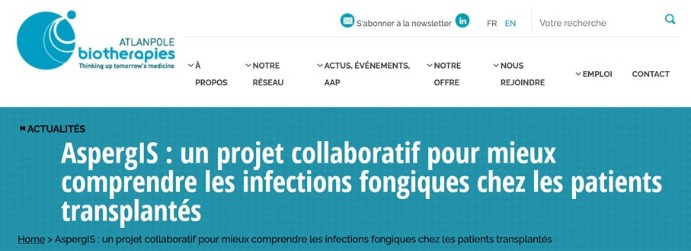AspergIS: a collaborative project to better understand fungal infections in transplant patients
Invasive fungal infections caused by the ubiquitous mould Aspergillus fumigatus are responsible for high morbidity and mortality in transplant patients. However, knowledge regarding the behaviour of this filamentous fungus and the pathophysiology of A. fumigatus infections in this specific clinical context remains elusive. Although there is increasing evidence that antimicrobial regimens recommended to prevent infectious disease in these patients have the potential to promote the selection of less susceptible fungal isolates, how the immunosuppressive regimen may influence the biology of key fungal pathogens remains to be explored. On this basis, our proposed research will study on a large scale the impact of the main immunosuppressive therapies used in transplant patients to prevent organ/cell rejection on the biology and genetic evolution of A. fumigatus.
More specifically, this 36-month scientific programme aims to (i) determine the capacity of immunosuppressants to influence the physiology of A. fumigatus; (ii) characterise the phenotypic changes in A. fumigatus selected by long-term in vitro exposure to immunosuppressants and decipher the underlying genetic determinants; and (iii) test the clinical relevance of the in vitro observations by carrying out phenotypic and genotypic characterisations on clinical isolates of A. fumigatus taken from transplant patients.
This 5 work package project will be based on a multidisciplinary approach including complementary strategies such as adaptive evolution in the laboratory, phenotype analysis, whole genome sequencing and state-of-the-art genome editing techniques to decipher the impact of long-term exposure to currently used immunosuppressants on stress adaptation, drug resistance, host-pathogen interactions and genomic variations in A. fumigatus. The answers to these questions are of paramount importance as they may have an impact on the incidence and progression of the disease and the overall risk of therapeutic failure.



